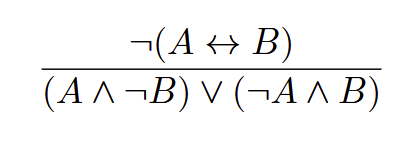1dm3
1/106
There's no tags or description
Looks like no tags are added yet.
Name | Mastery | Learn | Test | Matching | Spaced | Call with Kai |
|---|
No analytics yet
Send a link to your students to track their progress
107 Terms
Tautology
A statement that is always true
Contradiction
A statement that is always false
De Morgan's Law
~(P ^ Q) = ~P v ~Q
~(P v Q) = ~P ^ ~Q
Idempotent Laws
P ^ P = P
P v P = P
Distributive Laws
P ^ (Q v R) = (P ^ Q) v (P ^ R)
P v (Q ^ R) = (P v Q) ^ (P v R)
Identity Laws
P ^ t = P
P v C = P
Absorption Laws
P v (P ^ Q) = P
P ^ (P v Q) = P
Sufficient condition
"R is sufficient condition for s" means "if r, then s"
If P, then Q
P is sufficient for Q
Necessary condition
"R is necessary for s" means "if not r, then not s"
If not P, then not Q
P is necessary for Q
If Q, then P
necessary condition
If not q, then not p
Contrapositive of "if p, then q"
Not p and not q
Conditional statement ("if p, then q") expressed as or
Modus tollens
If P, then Q.
Not Q.
Therefore, not P.
Modus ponens (primero)
If P, then Q.
P.
Therefore, Q.
Converse error (affirming the consequent)
If P, then Q.
Q.
Therefore, P.
Inverse error (denying the antecedent)
If P, then Q.
Not P.
Therefore, not Q.
NAND-gate
An "and" gate followed by a "not" gate. (sheffer stroke)
NOR-gate
An "or" gate followed by a "not" gate. (pierce arrow)
Recognizer
A circuit that outputs a 1 for only one combination of input signals
Two's complement
A way to represent the negative of a binary number.
2^n - a
Form of the two's complement
Proposition (statement)
A sentence that can either be true or false
Predicate
A sentence whose truth value cannot be determined because there is a variable or missing information
Vacuously true
If p is false, then q is true. This statement is True.
If p is false, then q is false. This statement is True.
Every time p is false, the statement is True! What is this called?
For all x, if P(x) then Q(x).
P(a) is true for a particular a.
Therefore, Q(a) is true for that particular a.
Universal modus ponens
For all x, if P(x) then Q(x).
Q(a) is false for a particular a.
Therefore, P(a) is false for that particular a.
Universal modus tollens
For all x, if P(x) then Q(x).
For all x, if Q(x) then R(x).
Therefore, for all x, if P(x) then R(x).
Universal transivity
Constructive proof of evidence
Showing at least one possible x such that P(x) proves that "there exists some x such that P(x)"
Direct proof
Showing that P(x) is true for any x proves that "for all x, P(x)"
Zero product propert
If neither of two real numbers is zero, then their product is also not zero.
1. Write the 8-bit binary notation for a.
2. Flip the bits.
3. add 1 in binary notation
How do you convert a positive integer into the two's complement?
Every integer greater than 1 is divisible by a prime number.
Divisibility by a prime number theorem states...
Any integer greater than 1 is either prime or a factor of prime numbers.
Unique factorization of integers theorem states...
An irrational number
A non-terminating real number is
10 (base 2)
1 (base 2) + 1 (base 2) =
11 (base 2)
1 (base 2) + 1 (base 2) + 1 (base 2) =
Set
any collection of well-defined and well-distinguished objects.
Union
If A and B are 2 sets, set C’s elements are elements of A OR elements of B
Intersection
If A and B are 2 sets, set C’s elements are elements of A AND elements of B
Disjoint
Sets A and B are ___ if their intersection is empty
Mutually disjoint
n number of sets are ___ if the intersection of any 2 of them are empty
Difference
if A and B are 2 sets, set C’s elements are elements of A but not elements of B.
Complement
The ___ of a set A relative to the universal set U is the set C of all objects that are not elements of A.
Subset
A is a ___ of B iff every element of A is an element of B
Power set
The ___ A is the se containing all subsets of A
Cartesian Product A x B

Relation
a subset of a suitably chosen Cartesian product.
Domain
The ___ of a relation Rxy is the set of all x’s for which there is a matching y.
Reflexivity
Rxy, for all x, n = n for all n in x
Symmetry
n = m —> m = n, for any integers n and m
Transitivity
If n = m an m = k, then n = k for for any integers n, m, and k
Equivalence relation
a binary relation that is reflexive, symmetric, and transitive
Function
from A —>B is a relation such that for each element a in A, there is at most 1 element b in B such that <a,b> is an element of F.
Vertical line test
Injective or one-to-one
Different arguments have different function values.
Passes the horizontal line test
Surjective or on-to
Every element of the codomain is a function value
Bijective
both injective AND surjective
Partition
If all subsets of A art mutually disjoint, the subsets form a ___ of A
Argument
A statement claimed to be true and supporting evidence
Probabilistic / Inductive arguments
about things likely to be true
Deductive arguments
If the evidence is true, the claim must be true
Couterexample
A situation that makes the premise true but not the conclusion
Logic
the study of deductive arguments and their validity.
Mathematical Proof
finite sequence of statements and steps such that the statement in each step (except for the last) is either a premise (assumption) or a logical consequence of statements in one or more of the previous
steps; the statement in the last step is a logical consequence of statements made in previous steps
Propositional Logic
studies why and when arguments are valid based entirely on their use of certain sentence-forming expressions (i. e., words or strings of words). To this effect, it fixes the meaning of these expressions and offers rules for their deployment in arguments.
Statement / Proposition
A meaningful sentence to which we can assign a truth value
Truth Functor
Truth-functional sentence operators
Sentence operator
a word or a string of words with one or more blanks such that when the blanks are filled with sentences, the result is again a sentence.
Conjunctor ^
True if conjuncts A AND B are true
Disjunctor v
True if at least 1 disjunct A OR B are true
Subjunctor —>
True if and only if, the antecedent A is false or the consequent B is true
Negator
Flips the truth value
Universal quantifier
the quantifier phrase “for all x it holds that” or, “for all x”. Typically prefixes a subjunction of open sentences
Existential quantifier
the quantifier phrase “There is at least one x such that” or “there is an x”. Typically prefixes a conjunction of 2 open sentendes
Open sentence
A string of words or a phrase with one or more blanks such that a statement results when filling the blank or blanks with a closed term or terms
Direct Proof
A proof without needing to use the negation of the statement A
Direct proof template
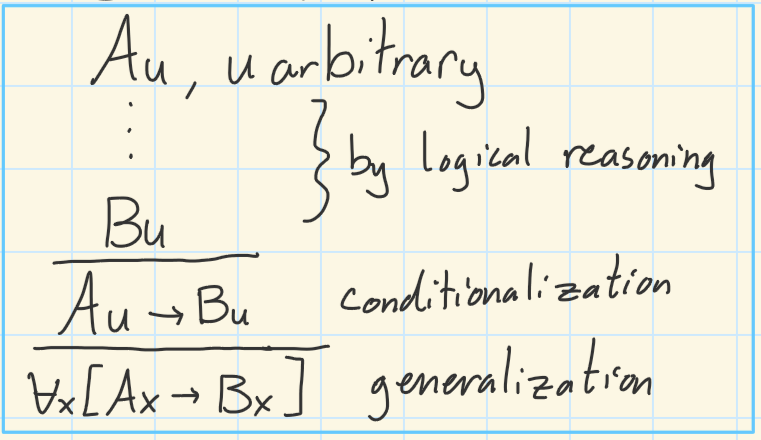
A direct proof is a composition of:
Conditionalization and generalization
Proof by cases template
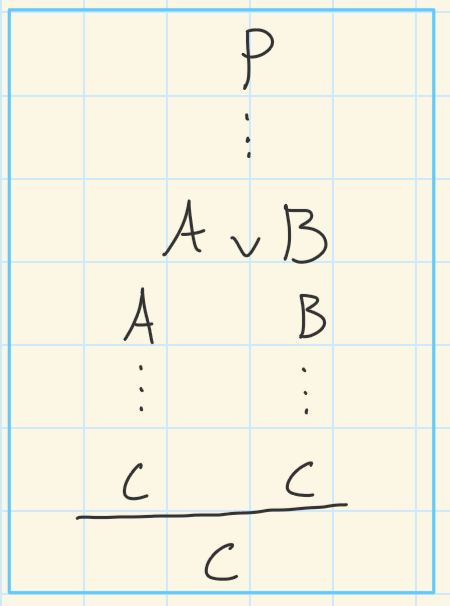
Proof by contraposition template
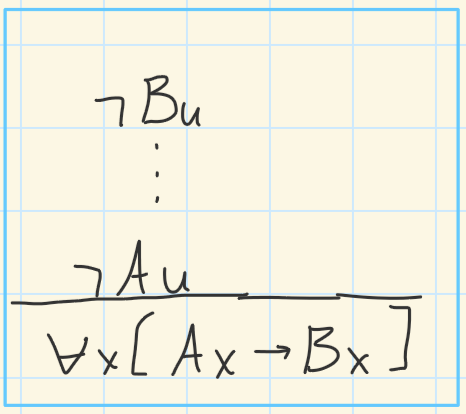
Indirect proof
Proof using the negation of A or B
Proof by contradiction template
The upside down T is an absurdity
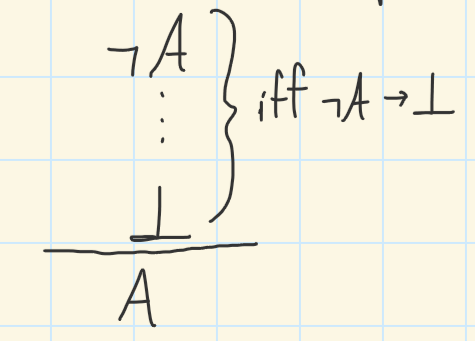
Induction
A template for proving statements that are true for all natural numbers
Induction template

Dedekind’s Axioms
(2 is injective)

Least element
a is the ___ of ordered-set A if x <= x for all x in A
Well-Order
An ordered set A is ___ -ed if every non-empty subset has a least element
Well-Ordering Principle (WOP)
Every non-empty subset of the natural numbers has a least element.
The set of natural numbers is well ordered
When is the negation of A true?
iff the unnegated statement A is false
Double negation
(works both ways)
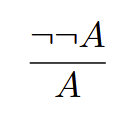
any B; ex falso quodlibet
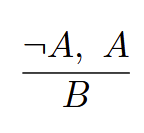
Commutativity for the conjunction
(works both ways)
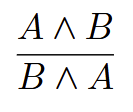
Commutativity for the disjunction
(works both ways)
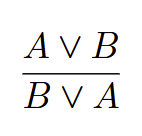
Distribution of the conjunction
(works both ways)
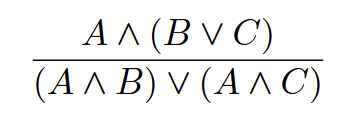
Distribution of the disjunction
(works both ways)
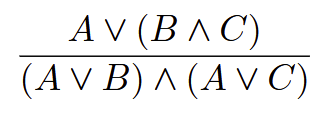
de Morgan conjunction
(works both ways)

de Morgan disjunction
(works both ways)
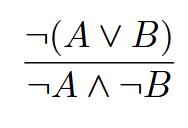
Negation of subjunction
(works both ways)
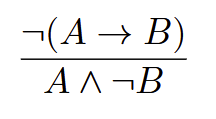
Negation of bi-subjunction
(works both ways)
